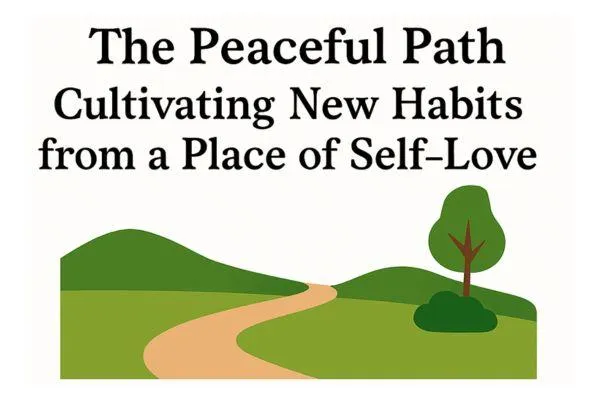
The Peaceful Path: Cultivating New Habits from a Place of Self-Love

Would you speak to a child you love the way you speak to yourself?
We’re often harsh with ourselves because we've internalized critical voices over time, parents, teachers, societal pressures, that taught us we had to be “better,” “more,” or “perfect” to be worthy of love. These voices get woven into our self-talk, like background noise we forget to challenge.
Masaru Emoto’s work is a fascinating blend of science, spirituality, and visual storytelling—one that invites us to rethink how our words and emotions might ripple through the very water that makes up most of our bodies. 💧
🧊 What Did Dr. Emoto Discover?
Dr. Masaru Emoto, a Japanese researcher and author, conducted experiments in which he exposed water to different stimuli: words, music, prayers, and emotions, and then froze the water to observe the resulting ice crystals under a microscope.
Positive words like “love” and “gratitude” produced beautiful, symmetrical crystals.
Negative words like “hate” or “you fool” resulted in distorted, chaotic formations.
Water exposed to classical music formed elegant patterns, while heavy metal music led to jagged, fragmented shapes.
He believed that water could “remember” and respond to the energetic vibrations of its environment—including human consciousness.
🧠 Why Does This Matter for Us?
Since the human body is composed of roughly 60–70% water, Emoto’s findings suggest that our self-talk, emotions, and intentions could influence our internal environment on a molecular level.
Kindness and love might promote harmony and healing.
Criticism and negativity could create internal dissonance, potentially affecting our emotional and physical health.
This idea aligns with practices like mindfulness, affirmations, and prayer, which are known to support well-being—even if the exact mechanisms are still debated.

🪞 Step 1: Awareness Without Judgment
Notice the language you use with ourselves, especially in moments of failure or fatigue.
Catch phrases like “I’m so stupid” or “I’ll never get this right”—pause and ask, Would I say this to someone I love?
💗 Step 2: Reparenting Through Compassion
Think of the child within you and speak to her as you would to a tender, hopeful little girl.
Replace criticism with curiosity: “Why do I feel this way?” → “What would help me feel safe and loved right now?”
🧘 Step 3: Affirmations That Reflect Truth, Not Perfection
Write and repeat affirmations that speak to your resilience and worthiness.
Example: “I am growing in love, and every habit I build reflects my care for myself and therefore others.”
🕯️ Step 4: Anchor in Daily Rituals
Let your habits become acts of kindness: lighting a candle during journaling, offering yourself a moment to breathe before meetings, savoring your meals,
These small choices are how you show up as your own protector.
🦋 Step 5: Celebrate Your Progress Like a Champion Would
Keep a “self-love wins” list. No achievement is too small: “I gave myself grace today,” “I finished a tough task,” “I rested even when I felt guilty.”
When we stop chasing perfection and stop seeking approval, we begin choosing what truly honors us. We build habits that reflect self-love, routines that help us feel grounded, cared for, and alive. And as we continue showing up for ourselves, we naturally raise the standard for how we allow others to treat you.

🌱Your Habits Are Sacred Invitations
Habits shaped by self-love aren’t just behaviors; they’re sacred invitations to return to ourselves. Each one says, I matter. I am worthy of care. When a habit rises from love, it no longer demands—we don’t force it, chase it, or fear losing it. We welcome it, like a trusted companion on our path.
“Instead of forcing ourselves to be strict, we begin caring for ourselves with love and purpose.”
🔁 Habits as Micro-Rituals of Self-Remembrance
These habits become micro-rituals, each breath, stretch, or pause a quiet honoring of who we are and who we are becoming.
Lighting a candle before journaling isn’t a task—it’s a way of saying: my inner world deserves light.
Choosing a nourishing meal isn’t about “good” or “bad” food, it’s whispering to ourselves, we deserve to feel healthy and alive.
Saying no to what drains us becomes a gentle boundary: my energy is sacred.
Even movement, even silence, becomes a love letter to our nervous system.
💖Self-Loving Habits Change Our Chemistry
When we act from self-love, our body listens:
Cortisol drops. Peace rises.
Our breath deepens. Our heart steadies.
We’re no longer living in reaction to wounds or expectations—we’re responding to truth.
We feel the difference between a habit born of punishment and one born of protection.
🛤️ The Ripple Effect: Inner Atmosphere Becomes Outer Experience
The more we choose loving habits, the more our inner atmosphere softens:
Conversations deepen.
Boundaries clarify.
Relationships shift.
Your sense of self-respect and self-love becomes non-negotiable.
It’s not just personal growth—it’s relational healing.
We no longer tolerate what dishonors us, not out of anger, but because we raised our standard.
💫 From Intention to Identity
This is the alchemy of our work: Going from fleeting motivation to embodied identity shift.
Let’s not ask “how can I make this habit stick?”. Instead ask:
What version of me does this habit nourish?
Is this who I’m ready to become?
Can I let myself be the architect of my routines?
🕊️ Self-Love Is a Repetition, not a Performance
And when we forget—when old patterns creep in, we don’t scold ourselves. We breathe, observe and are mindful. We begin again. We remember that the most powerful habit is grace, and every day is a great day to practice it!

